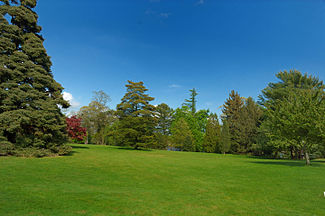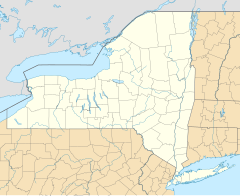Bayard Cutting Arboretum State Park
| Bayard Cutting Arboretum State Park | |
|---|---|

View of the Bayard Cutting Arboretum
|
|
|
Location of Bayard Cutting Arboretum State Park within New York State
|
|
| Type | State park, arboretum |
| Location | 440 Montauk Highway Great River, New York |
| Nearest city | Great River, New York |
| Coordinates | 40°44′49″N 73°10′4″W / 40.74694°N 73.16778°WCoordinates: 40°44′49″N 73°10′4″W / 40.74694°N 73.16778°W |
| Area | 691 acres (2.80 km2) |
| Created | 1936 |
| Operated by | New York State Office of Parks, Recreation and Historic Preservation |
| Visitors | 225,456 (in 2014) |
| Open | All year |
| Website | Bayard Cutting Arboretum State Park |
|
Bayard Cutting Estate
|
|
| Area | 750 acres (300 ha) |
| Architect | Charles Haight, Frederick Law Olmsted |
| Architectural style | Tudor |
| NRHP Reference # | 73001271 |
| Added to NRHP | October 2, 1973 |
Bayard Cutting Arboretum State Park is a 691-acre (2.80 km2) state park located in the hamlet of Great River, New York, on Long Island. The park includes an arboretum designed by Frederick Law Olmsted for William Bayard Cutting in 1887, as well as a mansion designed by Charles C. Haight.
The house at the heart of the park, Westbrook, is modeled on an English country house. Both the house and property were given to the people of Long Island by Bayard Cutting's widow and daughter "to provide an oasis of beauty and quiet for the pleasure, rest, and refreshment of those who delight in outdoor beauty; and to bring about a greater appreciation and understanding of the value and importance of informal planting".
The park has a nature trail and recreational programs, and there is a food and a gift shop at Westbrook.
Charles Sprague Sargent, director of the Arnold Arboretum advised in developing the extensive conifer collection north of the carriage house. Some of the most mature planting was damaged in Hurricane Gloria in 1985.
William Bayard Cutting's grandfather, Robert Cutting, had been Robert Fulton's partner in the ferry from Brooklyn to New York; they married sisters who were daughters of Walter Livingston. Cutting developed railroad interests in West India; his son was a pioneer in refining sugar from sugar beets.
In 1895 Cutting and his brother installed a golf course at Westbrook, which was the first private golf course in the United States.
...
Wikipedia

